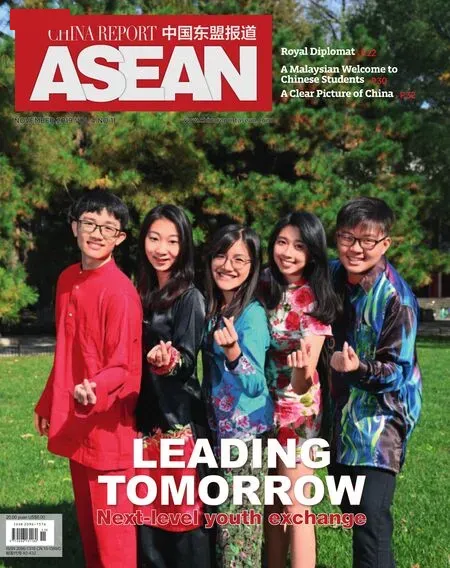A MALAYSIAN WELCOME TO CHINESE STUDENTS
By Wang Fengjuan, Yuan Yanan
Interview with Malaysian Minister of Education Dr.Maszlee Bin Malik
To commemorate the 45th anniversary of the establishment of diplomatic relations between China and Malaysia, China Report ASEAN interviewed H.E.Dr.Maszlee Bin Malik, Minister of Education of Malaysia.Maszlee highlighted Malaysia’s desire to welcome more Chinese students to study in Malaysia and become messengers of cultural exchange between the two countries.The two countries can also find new momentum for bilateral relations through cooperative publishing, he added.

Dr.Maszlee Bin Malik, Minister of Education of Malaysia.
China Report ASEAN: This year marks the 45th anniversaryof the establishment of diplomatic relations between China and Malaysia.How do you see China and Malaysia's achievements in education cooperation? In what areas do they need to strengthen cooperation?
Maszlee:Since the establishment of diplomatic ties 45 years ago, the two countries have made remarkable achievements in cultural exchange, but cooperation in education still needs to be strengthened.When I came to China to meet with Chinese Vice Premier Sun Chunlan, I also talked about strengthening exchange in academia and technical training and upgrading cooperation to the national level.China has developed world-leading concepts of vocational education, and the two countries should enhance connections in this field.During our talks, Vice Premier Sun agreed with me.I also hope that companies from both countries support the campaign.A good example is Huawei.China’s Huawei is now cooperating with 15 Malaysian universities to provide training and internships for students in information and communication technology.We hope that more high-tech Chinese companies will provide similar platforms for Malaysian students.Professionals trained this way can better serve cooperation between the two countries and promote mutual benefits.
China and Malaysia have made remarkable progress in higher education in recent years.The two countries have signed 131 cooperation agreements and memorandums of understanding.We hope that such projects can be continuously promoted,and we hope to establish a satellite campus to support the education cooperation through online training.For example,some Chinese schools might want to offer courses related to Malay, and we can provide such services.

The 8th Beijing International Education Expo attracted participation from government organizations, institutions, educational companies and other entities from 35 countries and regions.Pictured is a booth promoting education in Malaysia.
China Report ASEAN: Can you tell us about Chinese students studying in Malaysia?
Maszlee:According to my numbers, nearly 20,000 Chinese students are currently studying in Malaysia including 3,880 studying in primary and secondary schools and 15,690 in universities and colleges.More and more students will come to Malaysia as time goes on—I hope substantially more.
Chinese students have found many benefits to studying in Malaysia.China and Malaysia share considerable similarities in culture and cuisine.Chinese students more easily adapt to life in Malaysia than they would to living in the West, yet Malaysia is also a good place to learn English.Malaysia has high-quality educational resources, and its universities such as the University of Malaya and the National University of Malaysia are high-ranking globally.
We know that Xiamen University of China has opened a campus in Malaysia.The Malaysian government has always been very open to the idea and encouraged it.Five UK institutions of higher education and four wellknown Australian universities have also established satellite campuses in Malaysia.We welcome more universities from around the world to come to Malaysia and open schools according to the laws and regulations of Malaysia.We also encourage universities in Malaysia to cooperate with overseas universities to set up satellite campuses around the world to promote education cooperation through technological means.Thanks to supportive policy and educational resources ensured by the Malaysian government,Malaysia is one of the most preferred destinations for Chinese students to study abroad.
China Report ASEAN: Since taking office, you have actively pushed the national reading plan and become dedicated to making Malaysia a “country of reading.” What cooperation opportunities do you see for China and Malaysia in the field of publishing?
Maszlee:Since my first day working in the Malaysian Ministry of Education, I have embraced a great wish to make Malaysia a “reading nation,”in which the average number of books that citizens read every year will increase from 40 to 50 and the volume of books published each year will reach 30,000.This campaign has received wide support in Malaysia.We plan to increase average weekly reading time of the Malaysians to at least 12 hours by 2030.The country is moving steadily towards the goal and has achieved impressive results.Kuala Lumpur, the capital of Malaysia, has been named“World Book Capital” for the year 2020.UNESCO awarded this honorary title to Kuala Lumpur in recognition of the city’s continually improving reading atmosphere year after year.According to data from UNESCO, the literacy rate of Malaysia has reached 94.64 percent, the second highest among Southeast Asian countries.At the beginning of this year, Malaysia launched the “Malaysia Reading” campaign, which has been promoted on all major platforms including social media and received enthusiastic support and a warm welcome from all of society, reflecting the high regard Malaysians have for reading.
Promoting literacy is the first step in building a civilized country.Through reading,people can learn to appreciate others and amass respect for different cultures and experiences.As an educator,I believe that cooperation in literature and publishing is an important way to strengthen cultural exchange between China and Malaysia.Both China and Malaysia remain developing countries and share huge opportunities for cooperation in the book industry.We published 19,713 books last year, a number we hope to increase to at least 31,700 next year.Malaysia has rich resources in various fields such as literature, education,academics and politics.China and Malaysia can promote exchange and interaction between civilizations through cooperative publishing, which will certainly drive the vigorous development of the publishing industry in both countries and greatly enrich China-Malaysia relations.


